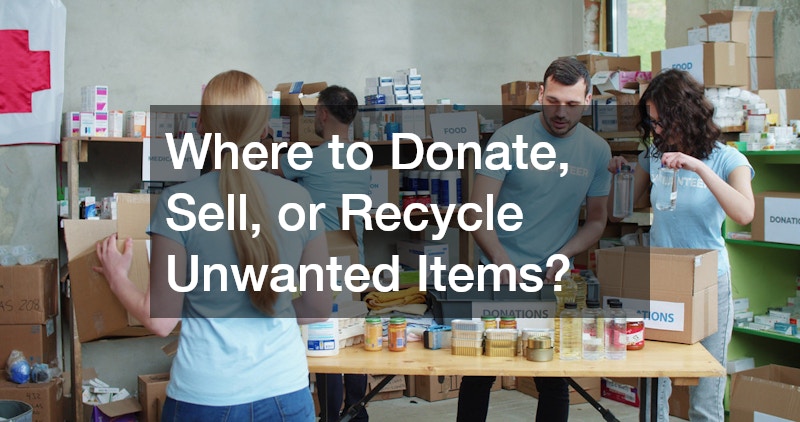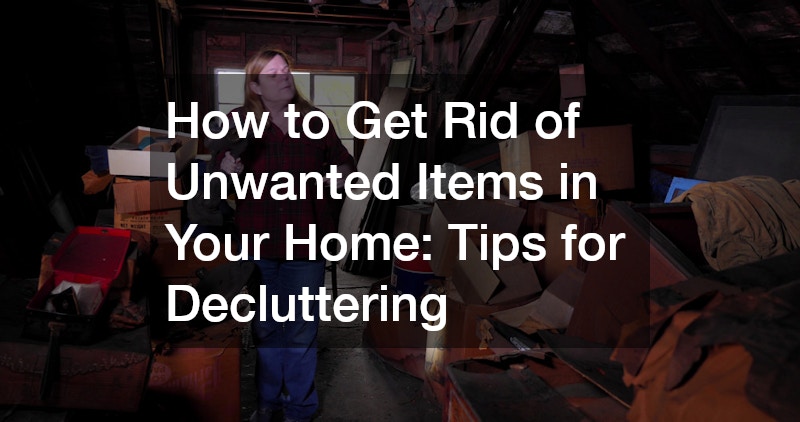Keeping a home organized can feel like a daunting task, especially when clutter starts to accumulate over time. Whether it’s old clothes, outdated electronics, or forgotten furniture, unwanted items can create both physical and mental clutter. Learning how to effectively declutter your space not only improves your living environment but can also enhance your overall wellbeing. From organizing storage facilities to selling second hand clothes or even obtaining cash for electronics, there are practical solutions to managing unwanted possessions. This guide explores comprehensive strategies to help you clear your home while maximizing space, reducing stress, and even making some money along the way.
Why Decluttering Is Important for Your Home and Mind

Maintaining a clean and organized home is not just about aesthetics—it has a profound impact on mental clarity, productivity, and overall quality of life. Clutter can create unnecessary stress, hinder daily routines, and make even small tasks feel overwhelming. By prioritizing decluttering, you can create a home environment that promotes calm, efficiency, and comfort.
Psychological Benefits of a Tidy Environment
Living in a cluttered space can lead to feelings of anxiety, frustration, and distraction. A tidy environment encourages relaxation and mental clarity, making it easier to focus on tasks or enjoy leisure activities. Removing unnecessary items can help reduce cognitive overload, allowing your mind to function more efficiently.
Increasing Your Home’s Functionality
Clutter can block movement, limit usable space, and create obstacles in everyday living. Decluttering opens up your home, allowing you to make better use of each room. Whether it’s freeing up space in your living room for family activities or creating a more functional kitchen, organization directly improves your home’s usability.
Saving Time and Reducing Stress
When everything has a designated place, you no longer waste time searching for misplaced items. Decluttering reduces stress by creating a predictable and orderly environment. Simple steps like using storage units or labeling items in storage facilities can save you significant time each day.
Improving Space for Better Living
More space means more freedom. Decluttering allows you to introduce functional furniture, add home decorations, or create work and hobby areas without feeling cramped. Open spaces also give a psychological sense of freedom, making your home feel larger and more inviting.
Influencing Personal and Professional Growth
A clean, organized home can have positive effects beyond domestic life. It fosters habits of discipline and organization that often translate into improved productivity at work. Moreover, decluttering can inspire confidence and a sense of accomplishment, boosting personal growth.
How to Recognize Unwanted Items in Your Home
Knowing which items to let go of is a critical step in decluttering. While sentimental attachments can make decisions challenging, a strategic approach helps determine what truly adds value to your life. Some items may have monetary value even if you no longer need them. In addition to electronics, consider options to sell your gold or other valuables, allowing you to declutter while gaining financial benefit.
Identifying Items Without Purpose
Ask yourself whether an item serves a functional purpose or brings you joy. Items that are seldom used or have no clear role in your daily life are prime candidates for decluttering. For larger unwanted items, consider consulting precast concrete companies or local dumpster rentals for disposal options.
Evaluating Sentimental Value vs. Clutter
Sentimental items are often the hardest to part with. While memories are important, retaining too many objects can create unnecessary clutter. Evaluating which items hold meaningful memories and which can be released is essential for a balanced home.
Implementing the 1-Year Rule
A simple yet effective strategy is the 1-year rule: if you haven’t used or worn an item in the past year, it may be time to let it go. This rule applies to clothing, gadgets, books, and other household items. Selling second hand clothes or opting for cash for electronics are practical ways to repurpose items instead of discarding them.
Understanding Emotional Attachment
Emotional attachment can complicate decluttering, especially for inherited items or collectibles. Reflect on why you are holding onto each piece and whether it aligns with your current lifestyle. Consulting an antique appraiser can also help determine the true value of certain sentimental or collectible items.
Gathering Feedback From Family Members
Family members can provide valuable insights on which items are essential and which are not. Engaging them in conversations about clutter ensures everyone’s needs and preferences are considered, reducing potential conflict.
What Is the Best Strategy to Begin Decluttering?

Starting a decluttering project can feel overwhelming, but a structured approach ensures efficiency and long-term results.
Choosing a Starting Point
Identify the area that causes the most stress or clutter in your home and start there. Many people begin with high-traffic spaces like kitchens, living rooms, or storage facilities. Tackling smaller areas first can build momentum and encourage continued progress.
Setting Realistic Goals and Timelines
Avoid attempting to declutter your entire home in a single day. Set manageable goals and timelines for each room or category of items. Break the process into weekly or monthly objectives to prevent burnout.
Creating a Decluttering Plan of Action
Draft a step-by-step plan that outlines which items to assess, which methods to use for disposal or sale, and where each item will go. This organized approach minimizes decision fatigue and keeps the process on track.
Prioritizing Based on Needs and Convenience
Focus on areas that will create the most noticeable impact. Clearing pathways, organizing storage units, and arranging essential items first provides immediate gratification and encourages continued effort.
Using Checklists to Track Progress
Checklists are an effective way to monitor your progress and celebrate small victories. List areas to declutter, categorize items for donation, resale, or disposal, and mark tasks as completed.
How Can You Effectively Sort and Organize Items?
Sorting is key to creating a functional and sustainable home. Using systematic approaches ensures items are organized logically.
Understanding the Importance of Categories
Grouping items by type or function helps maintain organization. Separate clothing, electronics, books, and miscellaneous items to streamline the decluttering process.
Using the Four-Box Method
Label four boxes as “Keep,” “Donate,” “Sell,” and “Trash.” This method allows you to efficiently sort items while making clear decisions about their future.
Keeping Similar Items Together
Store similar items in dedicated areas, whether in closets, cabinets, or storage facilities. Grouping items reduces clutter and simplifies retrieval.
Labeling for Easy Identification
Labels make it easier to locate and maintain organized spaces. Clear labeling in storage units or storage facilities ensures items remain orderly over time.
Regular Review and Maintenance
Decluttering is an ongoing process. Schedule regular reviews to ensure that unnecessary items do not accumulate and that storage spaces remain functional.
Where to Donate, Sell, or Recycle Unwanted Items?

Deciding where to direct unwanted items maximizes their value and impact. There are multiple options depending on the item type and condition.
Identifying Local Donation Centers
Many organizations accept gently used items. Donating not only clears your space but also benefits your community. Items such as furniture, clothing, and household goods can often be dropped off at local donation centers.
Exploring Online Selling Platforms
Selling items online allows you to reach a wider audience and earn money. Platforms are ideal for electronics, clothing, and collectibles. You can sell second hand clothes, old gadgets, or even furniture with relative ease.
Understanding Recycling Options
Items that cannot be reused should be recycled responsibly. Electronics, paper, and metal have designated recycling programs. Offering cash for electronics ensures that valuable components are properly handled and reduces environmental waste.
Hosting a Garage Sale
Garage sales provide an excellent way to declutter and make money simultaneously. Advertise locally, price items fairly, and be ready to negotiate with buyers.
Partnering With Community Swap Events
Community swap events allow you to exchange items with neighbors or friends. It’s an eco-friendly approach to decluttering while obtaining items you might need in return.
How to Manage Sentimental Items When Decluttering?
Sentimental items require careful consideration to avoid regret or emotional distress.
Creating a Memory Box
Limit sentimental items to a memory box. Include the most meaningful keepsakes, photographs, and small heirlooms. This preserves memories without creating excessive clutter.
Digitizing Keepsakes
Scanning photos, documents, and artwork is a modern way to preserve memories without keeping physical copies. Digital archives save space and allow easy sharing with family members.
Setting Boundaries for Keepsakes
Decide in advance how many sentimental items you will retain per category. Boundaries prevent over-accumulation and make decluttering less overwhelming.
Letting Go of Guilt and Emotional Ties
It’s natural to feel guilty when letting go of items connected to memories or loved ones. Remind yourself that memories reside in your mind, not in physical objects.
Passing Items to Family Members
If an item has sentimental or practical value to a family member, consider passing it on. This ensures the item remains meaningful while freeing up space in your home.
What Are Some Tips to Prevent Future Clutter?

Sustainable decluttering involves strategies to prevent clutter from returning.
Adopting a Minimalist Mindset
Focus on quality over quantity when acquiring new items. Minimalism reduces clutter, saves money, and emphasizes meaningful possessions.
Regular Decluttering Schedule
Set a consistent schedule to assess and remove unwanted items. Monthly or quarterly reviews keep your home organized and manageable. Valuable items such as gold or jewelry can also be sold for cash. Many local buyers or online platforms allow you to sell your gold, turning unwanted valuables into money while clearing clutter.
Setting Acquisition Limits
Control the number of new items you bring into your home. Establish limits for clothing, gadgets, or household items to avoid future clutter.
Avoiding Impulsive Purchases
Impulsive purchases often create items you don’t need. Planning purchases, making shopping lists, and avoiding impulse buying reduce unnecessary accumulation.
Integrating Organizational Hacks
Simple solutions like shelving, labeled bins, and storage units help maintain order. Utilize local dumpster rentals or rent a dumpster for bulk items to keep the process manageable.
How to Involve Family Members in Decluttering?
Family involvement ensures that everyone shares responsibility and understands the benefits of an organized home.
Communicating the Benefits
Explain how decluttering enhances space, reduces stress, and improves functionality. Highlight opportunities for financial gain from selling second hand clothes or cash for electronics.
Setting Family Decluttering Days
Designate specific days for family-wide decluttering. Shared activities make the process enjoyable and efficient.
Involving Kids With Decluttering Games
Turn decluttering into a game to encourage participation from children. Reward completion to maintain engagement and create positive habits.
Sharing the Responsibility
Assign family members specific areas or item categories. Sharing responsibility ensures no one feels overwhelmed and fosters teamwork.
Celebrating the Achievements
Celebrate milestones to reinforce positive behavior. A clean, organized home is an achievement worth recognizing.
What Are the Common Challenges in Decluttering and How to Overcome Them?
Decluttering comes with obstacles, but awareness and strategy help overcome them.
Overcoming Emotional Blockages
Sentimental attachments and guilt can hinder decision-making. Focus on functionality, memory preservation, and potential benefits of letting go.
Tackling Lack of Time
Decluttering takes time, but breaking tasks into manageable chunks makes it feasible. Even 15 minutes a day can lead to significant progress over time.
Fighting Decision Paralysis
When faced with too many choices, use strategies like the four-box method to simplify decisions. Categorization reduces stress and promotes decisive action.
Dealing With Resistance From Family
Family members may resist letting go of possessions. Use compromise, discussion, and incentives to address concerns while maintaining progress.
Maintaining Momentum and Motivation
Decluttering is a marathon, not a sprint. Celebrate small victories, track progress, and keep your goals visible to maintain motivation.
How to Create a Sustainable Decluttering Routine?
The ultimate goal is a home that stays organized without constant effort.
Establishing a Decluttering Habit
Make decluttering a habit by incorporating it into weekly routines. Short, consistent sessions prevent accumulation and maintain order.
Tracking and Reviewing Progress
Keep a log of completed areas, items sold, or donations made. Tracking progress provides motivation and insight into patterns of clutter.
Celebrating Small Wins
Recognize achievements, no matter how small. Each step toward a cleaner home is progress toward a healthier living environment.
Learning From Past Mistakes
Reflect on what worked and what didn’t in previous decluttering attempts. Use these lessons to refine your approach and avoid repeating errors.
Seeking Professional Help When Necessary
Professional organizers, moving services, or consultation with an antique appraiser can provide guidance, especially for challenging or sentimental items. Rent a dumpster or contact local dumpster rentals when tackling large-scale decluttering for an efficient process.
Decluttering your home is a transformative process that benefits both your physical space and mental wellbeing. By recognizing unwanted items, implementing strategic organization methods, and deciding how to dispose of or repurpose belongings, you can create a clean, functional, and enjoyable home. Selling second hand clothes, obtaining cash for electronics, consulting an antique appraiser, and utilizing storage units or storage facilities are practical ways to manage items responsibly. Involving family members, overcoming challenges, and establishing sustainable routines ensure long-term success. Whether it’s adopting a minimalist mindset, organizing your living spaces, or using local dumpster rentals and rent a dumpster services for large projects, decluttering offers a path to a more comfortable and fulfilling home life.


